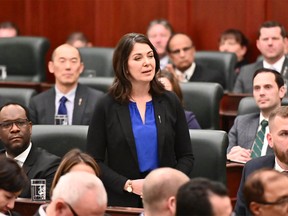Ottawa has the power to ‘reject’ provincial laws and could potentially invoke it to invalidate the Sovereignty Act

Article content
There it is in writing, finally, the promised bill that Danielle Smith elevated to the premier’s office, the one empowering Alberta to resist federal laws.
Advertisement 2
Article content
This is the Alberta Sovereignty Within a United Canada Act. It makes the Saskatchewan First Act, the prairie comparable, look tame and lukewarm.
Article content
The bill was controversial before it even hit the legislature’s floor. The NDP demanded a vote to allow it to be introduced, the first such move anyone could remember following a throne speech.
The VKP majority held that vote, with support from all the leadership candidates who opposed the Sovereignty Act during the party campaign.
The bill would give the UCP government authority to not only defy federal laws deemed unconstitutional, but to refuse to enforce any laws, policies or actions deemed harmful to the province.
The distinction is crucial.
It is one thing to challenge, say, Bill C-69 on the grounds that Ottawa is overstepping its constitutional bounds.
Advertisement 3
Article content
But it’s another matter entirely to claim the power to defy anything Ottawa does, or even plans, that is deemed harmful.
This takes the legislation squarely into the realm of electoral politics.
It’s all about the UCP versus the Trudeau Liberals. The bill creates electoral opportunities to intensify hostilities ahead of the provincial election set for next May 29.
But there is an elephant in the room, and Smith surely knows it.
The UCP makes no claim to formally overturn federal laws; only to ignore it, disobey it, or refuse to enforce it.
No province can invalidate the laws of another jurisdiction, especially Ottawa.
But Ottawa has the power to “reject” provincial laws, and could potentially invoke it to declare the Sovereignty Act null and void.
Advertisement 4
Article content
The UCP legislators are well aware of this prospect. They warn that refusal could lead to a real constitutional crisis. Of course, they don’t recognize that Alberta can ignite that crisis right now.

Ottawa has not banned recent Quebec language laws, despite calls to do so. It would take some brass to reject an Alberta law now.
No one would be happier about the uproar, one suspects, than our election-bound prime minister.
But Prime Minister Justin Trudeau has the option — and political dreams of his own. (Imagine a “Canada Sovereignty” campaign?)
Smith insists that the bill is in no way unconstitutional or intended to harm national unity. In the throne speech, the government said: “Ottawa is not our ruler. Ottawa is our partner.”
Advertisement 5
Article content
The premier feels she already has Ottawa’s attention and “I hope we never have to use this bill.” She doesn’t think the Fed will reject it, but “we’ll see how they react to this.”
Another remarkable feature of the bill is that Smith’s cabinet will be able to unilaterally change laws (not just regulations) to suit whatever move is planned.
-

Smith introduces flagship Alberta Sovereignty Within a United Canada Act, which gives cabinet new power
-

Alberta Lt.-Gov. Salma Lakhani delivers throne speech focused on affordability, health care reform, jobs and the fight against Ottawa
-

Opinion: Reburnt Alberta Sovereignty Act Reveals Smith’s Dilemma
-

Varcoe: Smith is willing to unleash sovereignty action on Ottawa’s oil spill emissions cap
-

Varcoe: Kenney says sovereignty bill will deliver ‘body blow’ and drive away investment
-

Savage: Act of sovereignty can be as damaging as the Trudeau government
The big question for many Albertans will be, is Smith going to tell me to disobey a law?
Advertisement 6
Article content
The Sovereignty Act specifically states that no individual or private company can be compelled to defy a federal law or plan. The government says only “provincial entities” are obliged to comply.
But the net has been cast very wide. Provincial entities include:
- Provincial public agencies;
- Provincial Crown-controlled organisations;
- Entities performing a provincial competence, duty or function;
- Entities receiving public funds dependent on the provision of a public service;
- A regional health authority;
- A public after-school school;
- a school board;
- A municipality;
- A municipal or regional police service.
The reach extends to the smallest NGO that can receive a grant to help opioid victims; it reaches upwards to the health system, every town and city, and the police. The duty to comply with the Sovereignty Act may also extend to the RCMP in terms of provincial contract.
Advertisement 7
Article content
Saskatchewan’s parallel bill does little more than firmly reiterate the province’s areas of exclusive jurisdiction, and establish a tribunal to assess the economic effect of federal moves.
This panel can “assess the steps that can be taken to minimize the economic impact of the federal initiative in Saskatchewan.”
The Alberta bill goes much, much further. With a motion from the legislature, the government can order a wide variety of organizations (all staffed by private individuals) to resist federal law.
The initial battle points have already been mapped out. Alberta will almost certainly refuse to comply with the federal cuts in fertilizer use. The province is likely to act against further “arbitrary” exemption reductions. The confiscation of firearms is an obvious flash point.
The UCP is also building resistance to federal “control” of how grant money is spent on health care, social programs, and education.
Decisions to implement the Sovereignty Act in specific areas will be made by the legislature in the spring. That’s when the real action begins — just in time for the election.
Don Braid’s column appears regularly in the Herald.
Twitter: @DonBraid
